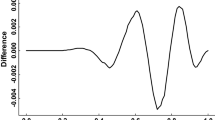Abstract
Recently, the characterization-based approach for the construction of goodness of fit tests has become popular. Most of the proposed tests have been designed for complete i.i.d. samples. Here, we present the adaptation of the recently proposed exponentiality tests based on equidistribution-type characterizations for the case of randomly censored data. Their asymptotic properties are provided. Besides, we present the results of wide empirical power study including the powers of several recent competitors. This study can be used as a benchmark for future tests proposed for this kind of data.
Similar content being viewed by others
References
Akritas MG (1988) Pearson-type goodness-of-fit tests: the univariate case. J Am Stat Assoc 83(401):222–230
Balakrishnan N, Chimitova E, Vedernikova M (2015) An empirical analysis of some nonparametric goodness-of-fit tests for censored data. Commun Stat Simul Comput 44(4):1101–1115
Barlow RE, Proschan F (1969) A note on tests for monotone failure rate based on incomplete data. Ann Math Stat 40(2):595–600
Cuparić M, Milošević B, Obradović M (2019a) New consistent exponentiality tests based on V-empirical Laplace transforms with comparison of efficiencies. Preprint arXiv:1904.00840
Cuparić M, Milošević B, Obradović M (2019b) New \({L}^{2}\)-type exponentiality tests. SORT 43(1):25–50
Datta S, Bandyopadhyay D, Satten GA (2010) Inverse probability of censoring weighted U-statistics for right-censored data with an application to testing hypotheses. Scand J Stat 37(4):680–700
Desu MM (1971) A characterization of the exponential distribution by order statistics. Ann Math Stat 42(2):837–838
Efron B (1981) Censored data and the bootstrap. J Am Stat Assoc 76(374):312–319
Gill R (1983) Large sample behaviour of the product-limit estimator on the whole line. Ann Stat 11(1):49–58
Henze N, Meintanis S (2005) Recent and classical tests for exponentiality: a partial review with comparisons. Metrika 61(1):29–45
Henze N, Wagner T (1997) A new approach to the BHEP tests for multivariate normality. J Multivar Anal 62(1):1–23
Jiménez-Gamero M, Milošević B, Obradović M (2020) Exponentiality tests based on Basu characterization. Statistics. https://doi.org/10.1080/02331888.2020.1774768
Karatzas I, Shreve S (1991) Brownian motion and stochastic calculus, vol 113. Springer, Berlin
Kattumannil SK, Anisha P (2019) A simple non-parametric test for decreasing mean time to failure. Stat Pap 60(1):73–87
Kosorok MR (2008) Introduction to empirical processes and semiparametric inference. Springer, Berlin
Koziol JA, Green SB (1976) A Cramer-von Mises statistic for randomly censored data. Biometrika 63(3):465–474
Lawless J (2002) Statistical methods and model for lifetime data. Wiley, New York, p 52
Meintanis SG, Milošević B, Obradović M (2020) Goodness-of-fit tests in conditional duration models. Stat Pap 61:123–140
Milošević B, Obradović M (2016) New class of exponentiality tests based on U-empirical Laplace transform. Stat Pap 57(4):977–990
Robins, JM, Rotnitzky A (1992) Recovery of information and adjustment for dependent censoring using surrogate markers. In: AIDS epidemiology. Springer, pp 297–331
Strzalkowska-Kominiak E, Grané A (2017) Goodness-of-fit test for randomly censored data based on maximum correlation. SORT 41(1):0119–0138
Torabi H, Montazeri NH, Grané A (2018) A wide review on exponentiality tests and two competitive proposals with application on reliability. J Stat Comput Simul 88(1):108–139
Van Trees HL, Bell KL (2013) Detection estimation and modulation theory. Wiley, New York
Ying Z (1989) A note on the asymptotic properties of the product-limit estimator on the whole line. Stat Probab Lett 7(4):311–314
Zhou M (1991) Some properties of the Kaplan–Meier estimator for independent nonidentically distributed random variables. Ann Stat 19(4):2266–2274
Acknowledgements
We would like to thank the anonymous referees for their valuable remarks and suggestions that improved the paper.
Author information
Authors and Affiliations
Corresponding author
Additional information
Publisher's Note
Springer Nature remains neutral with regard to jurisdictional claims in published maps and institutional affiliations.
The work of M. Cuparić and B. Milošević is supported by the Ministry of Education, Science and Technological Development, Republic of Serbia, Serbia.
Rights and permissions
About this article
Cite this article
Cuparić, M., Milošević, B. New characterization-based exponentiality tests for randomly censored data. TEST 31, 461–487 (2022). https://doi.org/10.1007/s11749-021-00787-7
Received:
Accepted:
Published:
Issue Date:
DOI: https://doi.org/10.1007/s11749-021-00787-7




